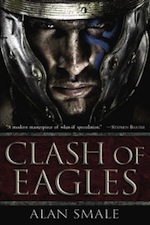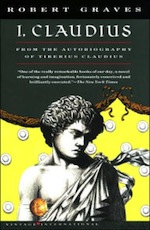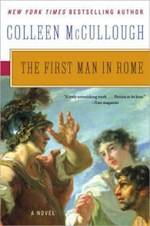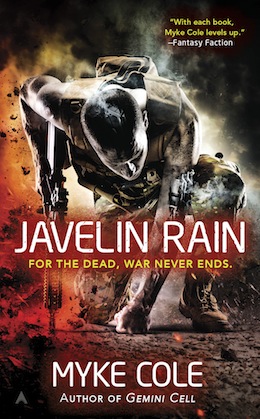What history can be considered “ancient” is a matter of some debate, but since I’m pretty much known as “the military guy,” I reckon things by battles. To me, the “ancient world” begins with the scrap between the Egyptians and the Canaanites at Megiddo in the 15th century B.C., and ends with the lopsided victory of the Goths over the Romans at Adrianople in 378 A.D.
I love reading about the ancient world for the same reason I love reading great fantasy. The ancient world is familiar enough to feel real to me, but different enough to fill me with a sense of transportation and wonder. Even more, I feel the ancient world resonate in everything I do today. So much of my military service (everything from my haircut to my unit organization) was born in ancient times, concepts so solid and enduring that they persist today. Stories about the ancients are a way for me to tap the back of the wardrobe, and discover a portal to another world, one full of adventure and danger, to which I am inextricably linked, and which has been a part of me all along.
Try these five novels and see if you feel it too.
Clash of Eagles by Alan Smale
 Smale’s alternate history is a work of speculative fiction, but one that is firmly rooted in impeccable research. Smale posits a world in which the Roman empire never fell, and follows the exploits of a legionary legate charged with finding gold in the new frontier of North America.
Smale’s alternate history is a work of speculative fiction, but one that is firmly rooted in impeccable research. Smale posits a world in which the Roman empire never fell, and follows the exploits of a legionary legate charged with finding gold in the new frontier of North America.
Smale’s research is impeccable, and he paints an incredible picture of life on the frontier for the Roman army, extrapolating flawlessly from the very Roman expeditionary life, which is very well documented by ancient standards. Smale gives equal attention to getting the mound building Native American cultures of the Northeast right, and readers can’t help but wind up with a detailed history lesson in the form of a story.
I, Claudius by Robert Graves
 This one almost needs no introduction. Named by both the Modern Library and Time as one of the 100 best English-language novels of the 20th century, this incredible narrative account will give you a clear window into Rome under the Julio-Claudian dynasty.
This one almost needs no introduction. Named by both the Modern Library and Time as one of the 100 best English-language novels of the 20th century, this incredible narrative account will give you a clear window into Rome under the Julio-Claudian dynasty.
The book brilliantly sets up the political intrigue endemic to Roman patrician circles, and shows the “golden prison” that leaders often occupy. Graves’ Claudius is at once sympathetic and identifiable, as well as intimidating and powerful. Best part, if you love it (and you will), there’s a sequel, Claudius the God. That may be expected by modern readers who are accustomed to serials, but it’s unusual for a book published in 1935.
The Afghan Campaign by Steven Pressfield
 This account of an infantryman in Alexander the Great’s army is gripping and haunting and incredibly timely given the conflagrations that have gripped this same region even in the present day.
This account of an infantryman in Alexander the Great’s army is gripping and haunting and incredibly timely given the conflagrations that have gripped this same region even in the present day.
Pressfield is the undisputed master of ancient military writing. A Marine himself, he gets the timeless nature of the foot-soldier’s experience, and invokes it flawlessly in this deeply nuanced and sympathetic portrayal. This is as close as a person can come to marching with Alexander’s army.
The First Man in Rome by Colleen McCullough
 This book has a dated prose style that requires some plowing, but it’s worth the work for the incredibly compelling and well researched account of the genesis of Rome’s “Social War” that spelled the end of the Republic.
This book has a dated prose style that requires some plowing, but it’s worth the work for the incredibly compelling and well researched account of the genesis of Rome’s “Social War” that spelled the end of the Republic.
McCullough’s book is so respected that it’s often cited as a source in secondary scholarship. It’s particularly valuable for those seeking to understand daily life in ancient Rome, from the vaulted heights of the Capitoline Hill to the filth of the Subura, McCullough covers it all.
As with Graves, there’s more if you want it. The First man in Rome is the flagship offering in McCullough’s Masters of Rome series, a seven volume sweeping epic that will take you all the way from Marius and Sulla in 110 B.C. to Mark Antony and Cleopatra in 27 B.C.
The Last of the Wine by Mary Renault
 This gorgeous and elegiac exploration of the Peloponnesian War is remarkable for its honest and intimate treatment of homosexuality in Ancient Greece.
This gorgeous and elegiac exploration of the Peloponnesian War is remarkable for its honest and intimate treatment of homosexuality in Ancient Greece.
The book covers Athens defeat at the end of the war, and the installation of the Thirty Tyrants, the pro-Spartan oligarchs whose heavy-handed rule marked one of the earliest examples of successful insurgency. Renault covers this as well, depicting Thrasybulus in highly sympathetic tones.
 Myke Cole is the author of the military fantasy Shadow Ops series. His latest novel, Javelin Rain, will be published by Ace/Roc on March 29th. As a security contractor, government civilian and military officer, Myke Cole’s career has run the gamut from Counterterrorism to Cyber Warfare to Federal Law Enforcement. He’s done three tours in Iraq and was recalled to serve during the Deepwater Horizon oil spill. He’s also a huge history nerd and tabletop wargamer. You can often find him simulating ancient battles in 1/72 scale at the Metropolitan Wargamers Society in Park Slope.
Myke Cole is the author of the military fantasy Shadow Ops series. His latest novel, Javelin Rain, will be published by Ace/Roc on March 29th. As a security contractor, government civilian and military officer, Myke Cole’s career has run the gamut from Counterterrorism to Cyber Warfare to Federal Law Enforcement. He’s done three tours in Iraq and was recalled to serve during the Deepwater Horizon oil spill. He’s also a huge history nerd and tabletop wargamer. You can often find him simulating ancient battles in 1/72 scale at the Metropolitan Wargamers Society in Park Slope.









